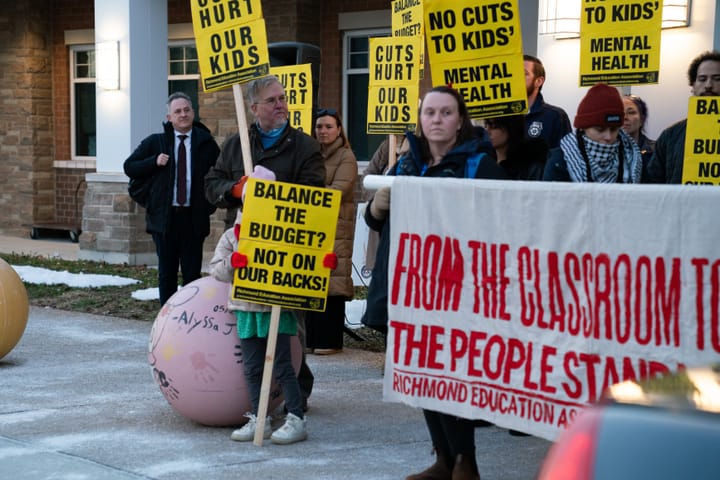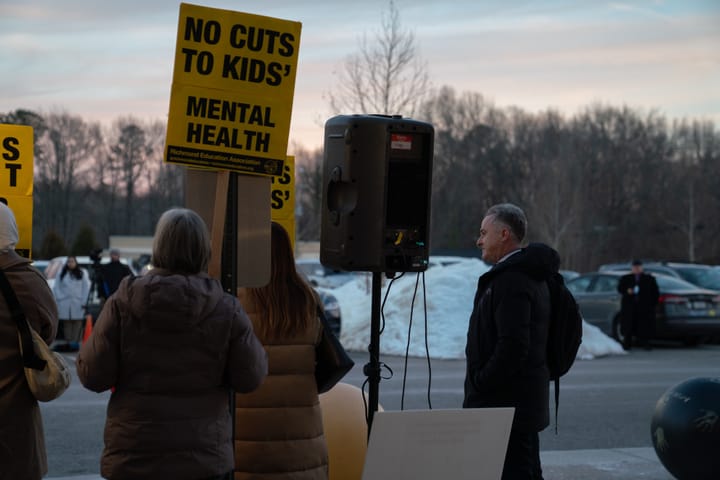
After initially embracing unions, RPS is proposing a more restrictive collective bargaining process for future deals
Richmond Public Schools officials are proposing major changes to the collective bargaining process with the unions who represent RPS employees, according to documents obtained by The Richmonder. Union leaders are unhappy those changes are being pushed through with limited input, just days before a new round of bargaining meetings is set to begin.
The biggest changes include the removal of an independent panel if both parties cannot agree on a negotiated contract, and limiting the number of topics unions can negotiate on during bargaining.
At the moment, the Board is set to review and vote on the changes during the upcoming October School Board meetings on Oct. 6 and 7.
“The push to make these changes seems rushed, especially when we are set to begin the collective bargaining process in mid-October,” wrote Richmond Education Association President Andrea Bryant in an email to members.
A spokesperson for RPS said that the division cannot comment on the matter until after the changes are presented at the October meetings.
RPS was the first school district to grant collective bargaining rights in Virginia – a state that does not allow employees to be forced to join a union or pay union dues as part of employment. Many school divisions in the state, like Henrico and Chesterfield counties, have unions but not collective bargaining rights.
The changes were first discussed during individual virtual meetings held on Sept. 18 between Superintendent Jason Kamras, RPS officials and the division’s three unions representing teachers and support staff, bus drivers and custodians – REA, Laborers' International Union of North America Local 804 and Teamsters Local 322.
Bryant and Teamsters’ President Brian Peyton told The Richmonder that the meetings were a “high-level overview” of the changes, but the exact language of the modifications were not initially presented.
“A week before the week of the 18th, we were asked to have a meeting, but we weren’t told what the meeting was going to be about,” said Bryant. “I asked what it was about, but no one told me. So we kind of walked into this meeting blind.”
REA officials were initially told they could only review the document after School Board members reviewed it and after it was posted on the division’s BoardDocs website, but Board Chair Shavonda Fernandez (9th District) ultimately provided the new language to the unions.
“It is important to recognize that the work ahead may be challenging,” Fernandez wrote in an email, responding to Bryant. “While the path may not always feel easy, it is essential that we remain steadfast in our commitment to seeing this process through. You providing your feedback, helps us do just that.”
The Richmonder is powered by your donations. For just $9.99 a month, you can join the 1,000+ donors who are keeping quality local journalism alive in Richmond.
Since then, union leaders have sent concerned emails to Board members and RPS administrators saying that the process RPS is following in presenting the changes is hurried and opaque.
“We want to be perfectly clear that a late minute passage of these changes would be deeply disrespectful to workers and the residents of Richmond. We deserve a transparent process,” wrote Peyton in a Sept. 23 email. “No decision should be made at the October meetings on this matter.”
Bryant wrote an email the day before, saying that the meetings didn’t “allow for a meaningful or informed discussion,” and requested that the administration, Board and REA members have a joint meeting, which she told The Richmonder has not happened.
“This approach falls short of the transparency and collaboration that defined our work together when the resolution was first passed four years ago,” she wrote.
The division has also met again with REA, and administrators told Bryant they had until Sept. 28 to submit language and feedback to the draft. Bryant said that’s not enough time.
“It looks shady because, basically, RPS has time to prepare their language and talk to their lawyers and have meetings amongst themselves,” she said. “Let’s say these changes were brought up in July or August, or even [early] September, I think that that would have given us time to say, ‘Hey membership, here’s what RPS is presenting. What do you think?’”
Bryant has since called on REA members to turn out to the October meetings to ask the Board to postpone the vote on the changes, and the union plans to have press conferences before the School Board meetings on both days. Petitions have also been created by REA to stop the vote. Peyton said that Teamsters will also join REA and will be at the Board meetings to demand the same thing.
“They’re trying to, for lack of a better term, neuter this agreement and the union’s ability to be able to represent the workers,” he said.
Fewer issues up for discussion, less school-day engagement
The division has proposed at least six significant changes to the current collective bargaining resolution it has with the unions.
The resolution currently allows union representatives to meet with members during the workday to discuss grievances and workplace issues, without needing to report it. Under the proposed changes, union representatives will only be allowed to meet before or after work hours, with the permission of a department director or school leader if meeting on school property.
While the division wants to “ensure a balanced and respectful work environment,” Moriah Allen, labor lawyer for Virginia Education Association – which REA is a member of – said the language is troubling.
“If you’re worried about something at your worksite and you just need a union representative to talk to you, well, your supervisor is going to know because before you can have that conversation, you have to get permission,” she said.
Members would also not be allowed to “interfere in the day to day operations of RPS or engage in behavior that negatively impacts the working conditions or environment of any RPS employee.” Allen said that provision is “nebulous and broad,” because behavior negatively impacting the work environment could also be valid concerns about work conditions.
She said she has not seen such provisions among the 11 school divisions in Virginia that have collective bargaining rights, including Alexandria, Fairfax and Montgomery counties.
“I’ve only seen this from Richmond Public Schools. And what this is saying is really scary,” she said.
Another change alters the way grievances would be handled. If the administration brought forward a complaint about a member, according to the proposed changes, it would be evaluated exclusively through written comments, instead of at a hearing.
“We have no guarantee that the School Board will even read what we submit. We have no opportunity to present witnesses or evidence or have a hearing or cross-examine the administration’s witnesses. We don’t have a right to counsel,” Allen said.
Allen, who has worked as a labor lawyer in New York for universities and at the federal National Labor Relations Board, said that the proposed changes create a “culture of surveillance” and an environment that is similar to what’s happening at the national level where free speech is being chilled.
Union members and representatives also specifically noted the final authority in stalled negotiations has moved from an independent panel to the School Board itself.
The proposals also limit what the unions can negotiate. Both a union and the division were each allowed to discuss two topics – like wages, work conditions and benefits – during the process of their first contract. For future contracts, the current rules allow unlimited topics to be brought for discussion.
Under the new changes, parties can only and always discuss any two topics. The topics were also reduced from general areas to an itemized list. For example, a discussion of wages currently can include salary, stipends and bonuses. Under the proposed changes, wages, salaries and stipends are all separate topics.
Discipline was also fully removed from the topics either party can discuss or negotiate on.
Allen said these changes, while still concerning, are not as surprising, because the collective bargaining process is a lengthy one. Bryant also acknowledged that changes could be made to the resolution overall.
“We do think that there should be changes to the agreement. It’s not perfect. But some of the changes that RPS wants to make are very restrictive to the union, versus it being more of an equal footing kind of thing for both sides,” Bryant said.
When RPS allowed bargaining rights for unions, Bryant and Allen said that the process incorporated union voices, but they believe the division is not following the same theme now.
“I see it as a huge regression. The terms of the resolution are so dramatically different, and the process is so dramatically different,” Allen said.
Contact Reporter Victoria A. Ifatusin at vifatusin@richmonder.org
The Richmonder is powered by your donations. For just $9.99 a month, you can join the 1,000+ donors who are keeping quality local journalism alive in Richmond.






